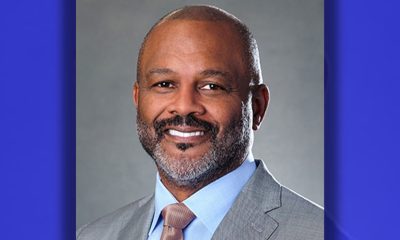Business
Carmakers Finish Strong in 2014; Are Even Better Days Ahead?

Dodge Ram pickup trucks are on display on the lot at Landmark Dodge Chrysler Jeep RAM Monday, Jan. 5, 2015, in Morrow, Ga. Buoyed by a resurgent economy, holiday sales, cheap gasoline and a love affair with pickup trucks, Americans headed to car dealers in droves last month, pushing full-year sales to what’s likely to be the highest level since 2006. (AP Photo/John Bazemore)
TOM KRISHER, AP Auto Writers
DEE-ANN DURBIN, AP Auto Writers
DETROIT (AP) — Confident in the economy and cheered by cheap gas, Americans are likely to push new car sales to their highest level in a decade this year.
Analysts expect sales to reach 17 million for the first time since 2005. That’s close to the record of 17.3 million set in 2000.
Low gas prices are giving buyers more confidence, whether they’re buying their first subcompact or upgrading to a larger SUV. Gas prices started this year at an average of $2.23 per gallon, down 33 percent from the beginning of 2014, according to AAA. The Energy Department estimates that lower gasoline prices will save U.S. households $550 this year — about four months of lease payments on a 2014 Honda Civic.
Popular new vehicles, like the Jeep Cherokee and Subaru Outback, are also drawing buyers.
Sales have now grown for five consecutive years — a rarity in the volatile auto industry.
While sales are growing, the pace has slowed from double-digit increases in 2011 and 2012. That’s good news for buyers, who can expect to see bigger discounts in competitive segments like midsize cars as automakers fight to steal sales from each other.
Alec Gutierrez, an analyst with the car buying site Kelley Blue Book, thinks sales could stay in the 17-million range for the next two or three years if interest rates stay low and the U.S. economy remains healthy.
December, with its holiday discounts and warmer-than-usual weather, brought buyers out in droves, with sales up 11 percent over the previous year. Automakers reported December and full-year sales Monday.
For all of 2014, sales were up 6 percent to 16.5 million vehicles, according to Autodata Corp. That was the biggest year for the industry since 2006.
Back then — as now — the Ford F-Series was the country’s best-selling vehicle and the midsize Toyota Camry was the best-selling car. The top-selling SUV was the Ford Explorer, but it was only No. 14 among all vehicles sold, according to Ward’s AutoInfoBank. In 2014 two smaller SUVs — the Honda CR-V and the Ford Escape — cracked the top 10 in sales as customers turned away from small and midsize cars as car-like handling and low gas prices made such vehicles more appealing.
Toyota, Fiat Chrysler and General Motors all reported 2014 sales increases, and Nissan, Subaru, Hyundai and Honda reported record numbers for the year.
Ford’s sales were flat, but the Ford brand remained the top-selling brand in the U.S. Among major automakers, only Volkswagen’s sales fell.
Here are more details about 2014 and trends to watch for this year:
BEST-SELLERS: General Motors — with its Buick, Chevrolet, Cadillac and GMC brands — sold the most vehicles in the U.S. in 2014 despite a scandal over the delayed recall of faulty ignition switches in older small cars. GM sold just over 2.9 million vehicles, up 5 percent from 2013.
— WINNERS AND LOSERS: Among major automakers, Subaru was the biggest gainer, with sales up 21 percent to 513,693 vehicles in 2014. Subaru’s three new utilities — the Crosstrek, Forester and Outback — drove sales. FiatChrysler was the year’s other big gainer, with sales up 16 percent to 2 million, thanks to strong demand for its Jeep and Ram brands. Volkswagen had a difficult year, as sales fell 10 percent while the German automaker waited for new vehicles to hit U.S. showrooms. Mini also struggled as gas prices fell, with sales down nearly 20 percent.
— SUV BOOM: Gas prices accelerated the switch from cars to SUVs. Light trucks, the category that includes SUVs, outsold cars in 2014 — the first time that’s happened since 2011, according to car shopping site Edmunds.com. That’s partly because automakers are offering more types of SUVs, including fuel-efficient subcompacts such as the Buick Encore, to appeal to young families and Baby Boomers. The trend is likely to continue in 2015 as more small SUVs, like the Honda HR-V, Jeep Renegade and Mazda CX-3, hit the market.
— LUXURY GROWTH: As the stock market rose, so did sales of expensive vehicles. BMW, Audi, Porsche and Land Rover all reported record U.S. sales in 2014. Lexus luxury sales outpaced mass-market sales last year, and they’re expected to do so again this year. Luxury makers are offering more models, like the new Maserati Ghibli sedan and Lincoln MKC SUV, and they’re expanding their customer base with lower-priced models like the Mercedes GLK-Class and Jaguar XE due out this year. Mercedes-Benz was expected to be the top-selling luxury brand in the U.S. for 2014.
— PICKUP WARS: Ford’s F-Series, the best-selling truck in the U.S. for 38 years, saw sales drop in 2014 as the company temporarily halted production to prepare for its new aluminum-sided F-150. The new truck arrived at dealerships in December, but inventory won’t be at normal levels until the middle of 2015. In the meantime, rivals are offering big deals to lure customers away. Ram truck sales rose 24 percent in 2014, while Silverado sales gained 10 percent.
Copyright 2015 The Associated Press. All rights reserved. This material may not be published, broadcast, rewritten or redistributed.
Bay Area
State Controller Malia Cohen Keynote Speaker at S.F. Wealth Conference
California State Controller Malia Cohen delivered the keynote speech to over 50 business women at the Black Wealth Brunch held on March 28 at the War Memorial and Performing Arts Center at 301 Van Ness Ave. in San Francisco. The Enterprising Women Networking SF Chapter of the American Business Women’s Association (ABWA) hosted the Green Room event to launch its platform designed to close the racial wealth gap in Black and Brown communities.

By Carla Thomas
California State Controller Malia Cohen delivered the keynote speech to over 50 business women at the Black Wealth Brunch held on March 28 at the War Memorial and Performing Arts Center at 301 Van Ness Ave. in San Francisco.
The Enterprising Women Networking SF Chapter of the American Business Women’s Association (ABWA) hosted the Green Room event to launch its platform designed to close the racial wealth gap in Black and Brown communities.
“Our goal is to educate Black and Brown families in the masses about financial wellness, wealth building, and how to protect and preserve wealth,” said ABWA San Francisco Chapter President LaRonda Smith.
ABWA’s mission is to bring together businesswomen of diverse occupations and provide opportunities for them to help themselves and others grow personally and professionally through leadership, education, networking support, and national recognition.
“This day is about recognizing influential women, hearing from an accomplished woman as our keynote speaker and allowing women to come together as powerful people,” said ABWA SF Chapter Vice President Velma Landers.
More than 60 attendees dined on the culinary delights of Chef Sharon Lee of The Spot catering, which included a full soul food brunch of skewered shrimp, chicken, blackened salmon, and mac and cheese.
Cohen discussed the many economic disparities women and people of color face. From pay equity to financial literacy, Cohen shared not only statistics, but was excited about a new solution in motion which entailed partnering with Californians for Financial Education.
“I want everyone to reach their full potential,” she said. “Just a few weeks ago in Sacramento, I partnered with an organization, Californians for Financial Education.
“We gathered 990 signatures and submitted it to the [California] Secretary of State to get an initiative on the ballot that guarantees personal finance courses for every public school kid in the state of California.
“Every California student deserves an equal opportunity to learn about filing taxes, interest rates, budgets, and understanding the impact of credit scores. The way we begin to do that is to teach it,” Cohen said.
By equipping students with information, Cohen hopes to close the financial wealth gap, and give everyone an opportunity to reach their full financial potential. “They have to first be equipped with the information and education is the key. Then all we need are opportunities to step into spaces and places of power.”
Cohen went on to share that in her own upbringing, she was not guided on financial principles that could jump start her finances. “Communities of color don’t have the same information and I don’t know about you, but I did not grow up listening to my parents discussing their assets, their investments, and diversifying their portfolio. This is the kind of nomenclature and language we are trying to introduce to our future generations so we can pivot from a life of poverty so we can pivot away and never return to poverty.”
Cohen urged audience members to pass the initiative on the November 2024 ballot.
“When we come together as women, uplift women, and support women, we all win. By networking and learning together, we can continue to build generational wealth,” said Landers. “Passing a powerful initiative will ensure the next generation of California students will be empowered to make more informed financial decisions, decisions that will last them a lifetime.”
Business
Black Business Summit Focuses on Equity, Access and Data
The California African American Chamber of Commerce hosted its second annual “State of the California African American Economy Summit,” with the aim of bolstering Black economic influence through education and fellowship. Held Jan. 24 to Jan. 25 at the Westin Los Angeles Airport Hotel, the convention brought together some of the most influential Black business leaders, policy makers and economic thinkers in the state. The discussions focused on a wide range of economic topics pertinent to California’s African American business community, including policy, government contracts, and equity, and more.

By Solomon O. Smith, California Black Media
The California African American Chamber of Commerce hosted its second annual “State of the California African American Economy Summit,” with the aim of bolstering Black economic influence through education and fellowship.
Held Jan. 24 to Jan. 25 at the Westin Los Angeles Airport Hotel, the convention brought together some of the most influential Black business leaders, policy makers and economic thinkers in the state. The discussions focused on a wide range of economic topics pertinent to California’s African American business community, including policy, government contracts, and equity, and more.
Toks Omishakin, Secretary of the California State Transportation Agency (CALSTA) was a guest at the event. He told attendees about his department’s efforts to increase access for Black business owners.
“One thing I’m taking away from this for sure is we’re going to have to do a better job of connecting through your chambers of all these opportunities of billions of dollars that are coming down the pike. I’m honestly disappointed that people don’t know, so we’ll do better,” said Omishakin.
Lueathel Seawood, the president of the African American Chamber of Commerce of San Joaquin County, expressed frustration with obtaining federal contracts for small businesses, and completing the process. She observed that once a small business was certified as DBE, a Disadvantaged Business Enterprises, there was little help getting to the next step.
Omishakin admitted there is more work to be done to help them complete the process and include them in upcoming projects. However, the high-speed rail system expansion by the California High-Speed Rail Authority has set a goal of 30% participation from small businesses — only 10 percent is set aside for DBE.
The importance of Diversity, Equity and Inclusion (DEI) in economics was reinforced during the “State of the California Economy” talk led by author and economist Julianne Malveaux, and Anthony Asadullah Samad, Executive Director of the Mervyn Dymally African American Political and Economic Institute (MDAAPEI) at California State University, Dominguez Hills.
Assaults on DEI disproportionately affect women of color and Black women, according to Malveaux. When asked what role the loss of DEI might serve in economics, she suggested a more sinister purpose.
“The genesis of all this is anti-blackness. So, your question about how this fits into the economy is economic exclusion, that essentially has been promoted as public policy,” said Malveaux.
The most anticipated speaker at the event was Janice Bryant Howroyd known affectionately to her peers as “JBH.” She is one of the first Black women to run and own a multi-billion-dollar company. Her company ActOne Group, is one of the largest, and most recognized, hiring, staffing and human resources firms in the world. She is the author of “Acting Up” and has a profile on Forbes.
Chairman of the board of directors of the California African American Chamber of Commerce, Timothy Alan Simon, a lawyer and the first Black Appointments Secretary in the Office of the Governor of California, moderated. They discussed the state of Black entrepreneurship in the country and Howroyd gave advice to other business owners.
“We look to inspire and educate,” said Howroyd. “Inspiration is great but when I’ve got people’s attention, I want to teach them something.”
Activism
Oakland Post: Week of April 17 – 23, 2024
The printed Weekly Edition of the Oakland Post: Week of April 17 – 23, 2024

To enlarge your view of this issue, use the slider, magnifying glass icon or full page icon in the lower right corner of the browser window. ![]()
-

 Activism4 weeks ago
Activism4 weeks agoOakland Post: Week of March 27 – April 2, 2024
-

 #NNPA BlackPress4 weeks ago
#NNPA BlackPress4 weeks agoCOMMENTARY: D.C. Crime Bill Fails to Address Root Causes of Violence and Incarceration
-

 #NNPA BlackPress4 weeks ago
#NNPA BlackPress4 weeks agoMayor, City Council President React to May 31 Closing of Birmingham-Southern College
-

 #NNPA BlackPress4 weeks ago
#NNPA BlackPress4 weeks agoBeloved Actor and Activist Louis Cameron Gossett Jr. Dies at 87
-

 Community1 week ago
Community1 week agoFinancial Assistance Bill for Descendants of Enslaved Persons to Help Them Purchase, Own, or Maintain a Home
-

 Activism3 weeks ago
Activism3 weeks agoOakland Post: Week of April 3 – 6, 2024
-

 Business1 week ago
Business1 week agoV.P. Kamala Harris: Americans With Criminal Records Will Soon Be Eligible for SBA Loans
-

 Activism2 weeks ago
Activism2 weeks agoOakland Post: Week of April 10 – 16, 2024
























































